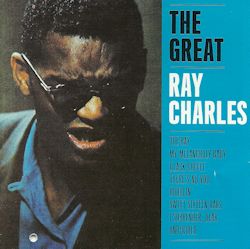1. The Ray
2. My Melancholy Baby
3. Black Coffee
4. There’s No You
5. Doodlin’
6. Sweet Sixteen Bars
7. I Surrender Dear
8. Undecided
9. Dawn Ray
10. The Man I Love
11. Music, Music, Music
12. Hornful Soul
13. Ain’t Misbehavin’
14. Joy Ride
15. Moanin’
16. Strike Up the Band
17. Birth of the Blues
Ray Charles – Piano, organ
Oscar Pettiford – Bass (tracks 3, 9-11)
Joe Harris – Drums (tracks 3, 9-11)
Joe Bridgewater – Trumpet (tracks 1, 2, 4-5, 7, 8, 12, 14)
John Hunt –Trumpet (tracks 1, 2, 4-5, 7, 8, 12-14)
David “Fathead” Newman – Alto sax, tenor sax (tracks 1, 2, 4-5, 7, 8, 12-14)
Emmett Dennis – Baritone sax (tracks 1, 2, 4-5, 7, 8, 12-14)
Roosevelt Sheffield – Bass (tracks 1, 2, 4-5, 7, 8, 12-14)
William Peoples – Drums (tracks 1, 2, 4-5, 7, 8, 12-14)
Phil Guilbeau, Thad Jones, Joe Newman, Clark Terry, Snooky Young – Trumpet (tracks 15-17)
Henry Coker, Urbie Green, Al Grey, Benny Powell – Trombone (tracks 15-17)
Marshall Royal, Frank Wess – Alto sax (tracks 15-17)
Frank Foster, Billy Mitchell – Tenor sax (tracks 15-17)
Charlie Fowlkes – Baritone sax (tracks 15-17)
Freddie Green – Guitar (tracks 15-17)
Eddie Jones – Bass (tracks 15-17)
Sonny Payne – Drums (tracks 15-17)
I thought of Ray Charles primarily as a vocalist until I heard his version of Makin’ Whoopee (a 1965 single which entered the top 50 in the UK as
well as the US). Ray took the song unbelievably slowly, extracting its deep irony, especially when he made a sidelong reference to his own personal
experiences with the law, which aroused huge laughter from the audience. He sang the song but the main interest for me was his piano accompaniment, which
was the essence of the blues and gospel. That characteristic is present throughout this reissue of a 1956 album, in which Ray concentrated on his piano
playing and showed that, like his singing, it was the epitome of soul.
On most of the originally released eight tracks Ray is accompanied by a sextet in which the saxophone of David “Fathead” Newman was the outstanding
feature. But the essence of Ray’s piano style is clear in a few trio tracks, such as Black Coffee, which he takes at a leisurely tempo (akin to
that of Makin’ Whoopee) which perfectly suits his feeling for the blues. You could add vocals by a blues singer on top of this trio track and it
would not sound out of place.
This album has the benefit of including all six tracks (tracks 9 to 14) which were recorded at the same time but not included on the original album.Ain’t Misbehavin’ has a remarkably inventive tenor sax solo by David “Fathead” Newman. Tracks 9 to 11 are trio recordings. Dawn Ray and Music, Music, Music are up-tempo cuts which confirm that Charles was a fine swinging jazz player. The Man I Love is
another hyper-slow track and a fairly straightforward melodic interpretation.
This reissue adds three final bonus tracks where Ray plays the organ with backing from a big band directed by Quincy Jones. These seem to come from the
1960 album Genius + Soul = Jazz and they reveal that Ray the organist was as soulful as Ray the pianist. The Basie-like accompanying band is very
gutsy, propelled by Sonny Payne’s drums and with estimable arrangements by Quincy Jones and Ralph Burns.
Tony Augarde
www.augardebooks.co.uk
